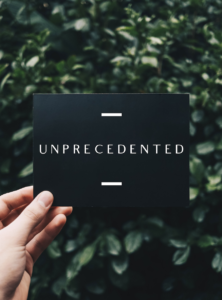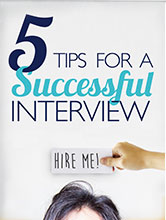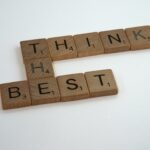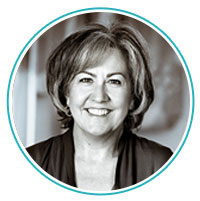The word for 2020 turns out to be UNPRECEDENTED not VISION like I first thought. (2020 Vision—catchy right? Oh well)
Photo by David Travis on Unsplash
If you’re a word nerd like I am you probably have noticed the frequency of the use of the word unprecedented. The dictionary definition is “Never been done before.” Well, that’s not a perfect fit; there have been global pandemics in several centuries through history; most recent is 1919-20 Spanish Influenza.
Unprecedented does apply when we think of all the unique attributes added on to this particular pandemic. We have never had technology at the ready access of millions worldwide. Another unique factor we can see the impact of is what information can be shared because of ready access to the Internet. We have devices. We have access. We have information.
I keep asking myself several questions: Do we have quality? How do we know whether or not it’s sound information? How do I manage the onslaught of information?
If you’re like me then avoiding the challenge has become a regular thing. I avoid listening to too much noise; I mean news. I avoid having online interactions with people who are quick to share their opinions and inform me that they’re right. I avoid getting into discussions with individuals who demonstrate a level of EQ that I find an additional challenge.
Photo by Priscilla Du Preez on Unsplash
Are you familiar with those two letters EQ and what they represent?
Emotional Intelligence. I’ve written about this before but today I want to make the connection between EQ and the important practice of self-care by posing this question:
When is Avoiding a Challenge a Form of Self-Care?
Let’s start by a 30,000 foot view of emotional intelligence. Research has been done over the past dozen or so years, both quantitative and qualitative data collection, showing results that people possess varying levels of emotional self-knowledge and skills to process and interact with others on an emotional level. That’s a lot of information packed into one sentence! Since this is not a scholarly post I’ll let you read up on your own. Suffice it to say, EQ has been proven to be an essential quality of transformational leadership, which is my jam.
What about self-care? I’d like to put forth the value of self-care beyond rest and relaxation; beyond a massage and facial and say that there are deeper levels of self-care we can practice. In fact self-care practices can also be soul care practices.
We are tasked with caring for ourselves once we become adults. We focus on earning a living, having a home, relationships, and hopefully elements of self-care. 2020 has pushed at all our limits; learning and practicing full body self-care is vital. Caring for our mind, our emotions and our physical self are woven into effective soul care practices. I love this quote “We are not human beings having a spiritual experience we are spiritual beings having a human experience.” There are many attributions for this quote but no original source is known I’m sorry to say.
Our entire self that walks around needs care and sometimes avoiding a challenging conversation or topic is a method of self-care when it is a choice. Click To TweetChoices can become habits and in this case avoidance is not something you want to have become a habit. However, there are times when your emotional intelligence will tell you it is best for your whole self to avoid entering into a particular fray. There will be other times when you will know that you need to engage.
Paying attention to the circumstances will help you discern your best action.











 Hi there! I'm Lisa. I am a native California girl married to my best friend, Colin; we currently live and work in the Silicon Valley. I am privileged to be mom to two fantastic grown sons and mom-in-law to a wonderful daughter.
Hi there! I'm Lisa. I am a native California girl married to my best friend, Colin; we currently live and work in the Silicon Valley. I am privileged to be mom to two fantastic grown sons and mom-in-law to a wonderful daughter.